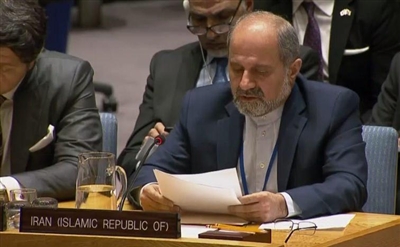"As a victim of terrorism who has lost more than 17,000 of its citizens as a result of terrorist attacks, Iran is determined to continue combating terrorism in all its aspects, including its financing." Said Eshaq Al-e-Habib, the deputy ambassador of Iran to the UN on Thursday at a UN Security Council meeting.
The full text of his speech is as follows:
In the Name of God, the Most Compassionate, the Most Merciful,
Mr. President,
I thank you for organizing this open debate as well as the briefers for their input.
Terrorism is a real threat, and the recent terrorist attacks in New Zealand have shown once more that no country is immune to this pervasive evil.
Combatting it requires a comprehensive preventive approach.
This means the root causes of terrorism should be addressed first and foremost.
From this perspective, preventing and combating the financing of terrorism is of high importance.
As a victim of terrorism who has lost more than 17,000 of its citizens as a result of terrorist attacks, Iran is determined to continue combating terrorism in all its aspects, including its financing.
To this end, Iran has enacted a National Strategy for Countering Terrorist Act and a number of laws which include preventive measures for the financing of terrorism. The latter is addressed in several bilateral agreements as well. Iran also has an active Financial Intelligence Unit.
Preventing and combating the financing of terrorism requires genuine political will by all States as well as efficient international standards.
For several years, Da’esh received a large amount of petrodollars and other financial donations. It also gained considerable revenue through looting and the sale of cultural properties of Iraq and Syria as well as exporting their oil.
Even now, terrorist groups such as Al-Nusrah Front in Syria, in addition to enjoying the political and military support of certain countries, are receiving significant financial contributions.
These facts alone reveal that not only the existing standards lack adequate efficiency but also many countries – as confirmed today by one of the briefers - are not implementing such standards.
However, interestingly, for clear political reasons, those countries have never been listed by those institutions setting the standards.
If such countries are not held accountable, they would be emboldened to continue financing terrorists.
Indeed, counter-terrorism activities are effective only when double-standards and selective approach are avoided and all States cooperate fully and responsibly.
Some countries use both counter-terrorism and terrorism as a foreign policy tool.
One example is designating adversaries as “State Sponsors of Terrorism”, which is based exclusively on political motivations and thus has no legitimacy.
This is also the case with regard to the unilateral labeling of certain popular political parties in other States as terrorists.
The irony is that those who adopted such policies are those who created certain terrorist groups and, based on their own short-sighted national interests, delisted known terrorist groups and provided them with a safe haven.
Likewise, they continue to support groups that are even designated as terrorists by the Security Council.
Finally, we must not forget that foreign invasion and occupation are the main factors in creating conducive grounds for terrorism.
While the inherent right to resist foreign invasion and occupation must not be equated with terrorism, it is clear that in order to uproot terrorism, occupation and invasion must come to an end.
If unchecked, terrorists and occupiers will evolve into a coalition. In fact, it has already happened. Israel supports terrorists in Syria in different ways, including healing the wounds of their terrorist sisters and brothers.
I thank you, Mr. President.
![]()

